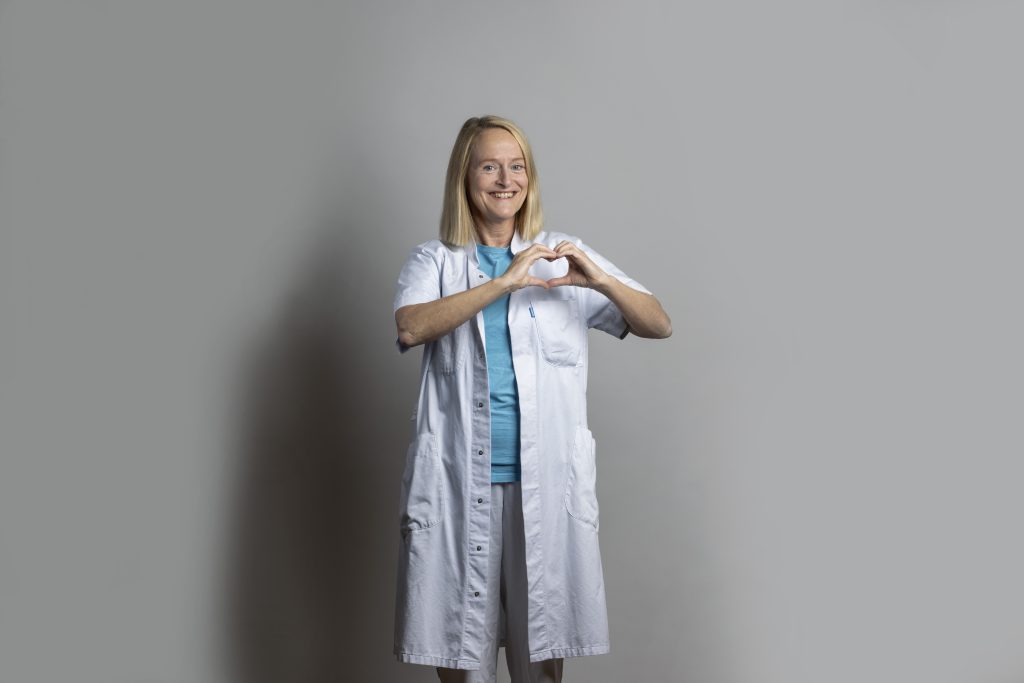The lymphatic system is a mysterious network of vessels running through our body. It collects excess fluid from cells to prevent us from swelling and it defends us against disease. But when problems arise, how can patients be helped? Surgeon and professor Vibeke Hjortdal wants to know. As part of a project funded by the Novo Nordisk Foundation Research Leader Programme, she will combine years of fundamental and clinical knowledge to help patients.
As a consultant cardiothoracic surgeon at Rigshospitalet and research professor at the University of Copenhagen, Vibeke Hjortdal has combined clinical practice and fundamental research throughout her career.
“I started doing research as a medical student back in the 1980s,” she explains. “I was driven by curiosity and the fact that the medical school curriculum was quite rigid, but at the time I didn’t think it would benefit my studies!”
On the contrary, by the early 2000s she was a compassionate clinician and renowned researcher with around 100 papers to her name. It was at this point in her career that her research interests began to focus on the lymphatic system.
“I was in London on a year-long fellowship to learn how to operate on children born with heart problems,” explains Vibeke Hjortdal. “But conversations with my senior colleague led us to ask if the lymphatic system might be involved in some of the issues we saw in these patients and we discussed ways to approach this.”
Fundamental knowledge
Back in Denmark, she followed a complementary approach to her collaborator in the UK, studying how lymphatic vessels taken from adults without congenital heart disease functioned in the lab.
“It felt far away from the patients and their problems,” she says, “but we were still deciphering part of the puzzle.”
Later, her research moved from isolated vessels to the human. Her team developed an imaging technology that showed for the first time where lymphatic vessels were inside living, healthy people. She also discovered how the system responds to everyday physiological challenges such as a person standing up or lying down.
“It had been difficult to look at how the human lymphatic system works,” she explains, “but we discovered it’s a very reactive system.”
More recently, Vibeke Hjortdal and her team discovered that the lymphatic systems of patients with congenital heart disease works differently. Beside collaborators in the USA, they discovered that some patients have problematic extra vessels treatable that can be blocked using a catheter and specialist glue. However for other patients, vessel contraction is not very forceful, it’s not the right frequency, or the valves aren’t well developed causing large fluid swellings in the legs.
“In these patients, it’s no help to just block some vessels,” she says, “we need other treatment options.”
From the lab to the clinic
Vibeke Hjortdal will explore these treatment options as part of the Novo Nordisk Foundation Research Leader Grant.
“One reason this grant is so fantastic, is that I can bring new people into the field and excite them about our research,” she says. “Together, we want to find new medication that can improve lymphatic vessel function in patients with congenital heart diseases.”
Thanks to her initial basic science studies, she knows which drugs might work. Now she can take this fundamental knowledge and try to translate it into a clinical setting.
“One drug might have a desired impact on a lymphatic vessel in the lab, but if it negatively interacts with blood vessels in the patient, then it’s unclear if the net effect will be beneficial,” she explains. “This grant moves us closer to understanding how those drugs work.”
Vibeke Hjortdal also wants to know if exercise can improve the lymphatic system in patients with congenital heart diseases, similarly to how exercise might strengthen muscles in our limbs.
“We’ve done some studies in healthy volunteers showing that repeated hand grips increase the lymphatic system’s function,” she explains. “But we don’t know if this has a lasting effect. Can we exercise the muscles around our lymphatic vessels over a longer period of time and train them to become stronger?”
Ripples in the water
Much of Vibeke Hjortdal’s research is focused on patients with congenital heart diseases. But the knowledge that the Research Leader Programme funds will enable can ripple out and be applied to other, unexpected clinical settings. Patients with breast cancer who have their lymph nodes removed might suddenly experience a huge swelling in their arm several years after surgery.
“The problem is related to the missing lymph node, but why did it take five years for the problem to show up?” she asks. “Even after more than 20 years there are a lot of questions we have about the lymphatic system. Thanks to the Novo Nordisk Foundation grant, we are now back at the patient – this time with more knowledge and more equipment.”
DKK 361 million awarded
The Foundation’s Research Leader Programme funds daring and innovative project ideas that may lead to significant scientific breakthroughs. The five-year grants are awarded to talented researchers at different stages of their careers.
A total of DKK 361 million has been awarded to 37 researchers in the 2023 round. Vibeke Hjortdal is one of 6 Distinguished Investigators to receive an award, which is granted to established researchers.
In total, the Foundation has now awarded more than DKK 2 billion to more than 200 researchers through the Programme since it was established in 2018.
Read more here: https://researchleaderprogramme.com/
Further information
Christian Mostrup, Head of Press, Novo Nordisk Foundation, cims@novo.dk, +45 3067 4805

